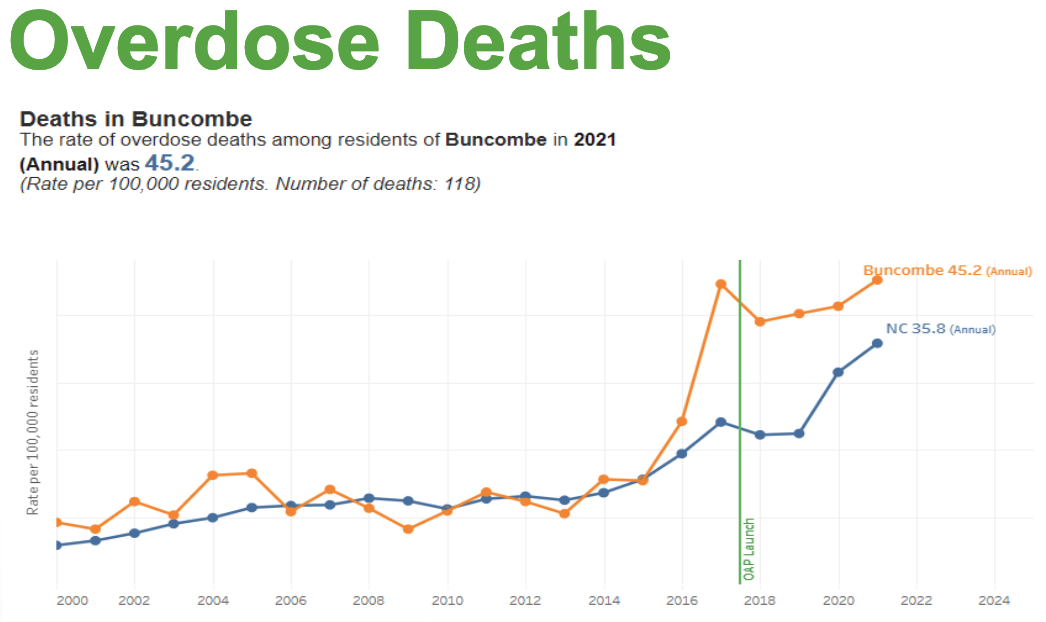By Will Bahr
The opioid crisis is bad everywhere in North Carolina. It’s worse in Buncombe County.
According to figures shared with the county Board of Commissioners by Dr. Shuchin Shukla, a physician and opioid crisis educator with the Mountain Area Health Education Center, Buncombe’s rate of overdose deaths has exceeded the statewide average since at least 2016. In 2021, the county suffered 45.2 deaths per 100,000 residents, compared with 35.8 deaths per 100,000 for North Carolina as a whole.
Shukla was among several stakeholders who briefed the board about opioid issues Oct. 4. Representatives from local reentry program Sunrise Community for Recovery and Wellness, the county’s Post Overdose Response Team and the Buncombe County Sheriff’s Office all shared updates on their work and discussed specific efforts they’d like to see supported.
The briefing came as Buncombe continues to plan its spending of over $16 million toward fighting the opioid epidemic. That money, which comes from a historic settlement in litigation involving opioid distributors and manufacturers, will be paid to the county in increments over 18 years. Buncombe has received $621,438 so far and is slated to receive another payment of nearly $1.4 million soon.
Current Sunrise employees Kat Sullivan and Tyler Grooms spoke candidly of their histories with addiction and the necessity of reentry programs. Grooms, who said he had been 18 months sober as of Oct. 4, said that he had previously “overdosed over 100 times — as far as I know, more than anyone else in Western North Carolina.”
Speaking from experience, Grooms emphasized the importance of reentry programs after incarceration, positing that “when people get locked up, coincidentally, they get sober.” To prevent and treat relapses post-lockup, Grooms argued, the county must continue to fund programs like Sunrise’s Linkage2Care Re-entry Program.
Meanwhile, Shukla listed medication-assisted treatment as among the most effective responses to the crisis. The Buncombe County Detention Center has been employing the practice among the general jail population since 2020, and Sheriff’s Office officials said overdose deaths among people passing through the jail had subsequently decreased by 22%.
Shulka also pointed to the importance of naloxone, a drug that counters the effects of an opioid overdose in real time. The medication, commonly known by its brand name Narcan, is regularly used by local efforts like PORT to prevent overdose deaths. Echoing Grooms’ testimony, Shukla said that targeted naloxone distribution has been particularly effective among the formerly incarcerated.
The demand for these lifesaving drugs is soaring, noted Shukla, but funding for supply can be an issue. “These are the things that if I was a taxpayer — and I am a taxpayer — I’d want my elected officials to invest in,” he said.
While the board made no motions during the informational briefing, members appeared engaged and highly supportive of the information provided. Commissioner Amanda Edwards said the presentations “couldn’t have come at a better time for us.”
Conservation easements approved
In keeping with the county’s goal of preserving 20% of Buncombe land by 2030, the board unanimously approved a $384,000 budget amendment to fund a package of six conservation easements during its regular meeting Oct. 4. Together, those projects will protect approximately 590 acres from future development, roughly a tenth of the additional 6,000 acres the county needs to meet its 20% target. The money came from $750,000 in funds that had previously been allocated for conservation easements this fiscal year.
The biggest item among those projects was $135,000 toward a 234-acre easement at Camp Woodson in Black Mountain. Buncombe had previously allocated $120,000 toward that easement purchase last fiscal year; the property will now be stewarded by Hendersonville-based nonprofit Conserving Carolina.



There’s no contrary subject matter expert to what Shukla is saying. Cancelling SUD treatment is the last thing I mean by that.
“Stricter drug laws DO NOT improve drug use rates, overdose rates or recidivism, but DO increase costs.” – Shukla
This is the Pew article:
https://www.pewtrusts.org/en/research-and-analysis/issue-briefs/2018/03/more-imprisonment-does-not-reduce-state-drug-problems
Are there advocates for decriminalizing / legalizing Illegally Manufactured Fentanyl (IMF) sitting on COA council or among the BCG commissioners? How about the city manager and county manger? Dr. Shukla’s and BCG leadership versions of reality needs another voice of reason.
“[…] research findings suggest that the most effective response to drug misuse is a combination of law enforcement to curtail trafficking and prevent the emergence of new markets; alternative sentencing to divert nonviolent drug offenders from costly imprisonment; treatment to reduce dependency and recidivism; and prevention efforts that can identify individuals at high risk for substance use disorders.” – Pew article
“[…] interventions include collaborating with community organizations to dismantle open-air street markets by, among other things, telling drug dealers face to face that they will probably face punishment if they continue to sell drugs.” – Pew article
I have challenged COA and BCG to produce PSAs where they get to call on IMF traffickers and users to stop.
So, law enforcement — including a baseline of incarceration as a deterrent — is part of the WNC Counter IMF Strategy. Because there isn’t going to be decriminalization / legalization of IMF any time soon. This Pew report says most Americans want action on the drug trafficking organizations.
The ratio of IMF deaths per emergency room visits is 2:6. So, it’s like playing Russian roulette with two rounds in a revolver. If there’s Naloxone vending machines everywhere, including schools, and there’s more and more SUD activity due to more and more acceptance of this deadly profiteering, the deaths of all these young Americans is unlikely to drop. Something else needs to be added to the list of solutions.
Waiting another year with this over reliance on harm reduction with Buncombe and Asheville leadership is unlikely to have great outcomes. It’s about the amount of cash involved in IMF trafficking.